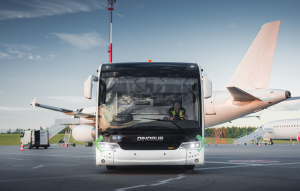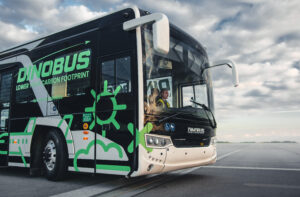The global shift towards renewable energy has positioned electric vehicles as the hallmark of innovation and sustainability. Building on the massive success of electric cars, the next frontier in green transportation is the adoption of electric buses. Heavier, more consistent in their routes, and often central to public and specialized transit systems, electric buses present a transformative opportunity for greener operations. Governments worldwide are championing eco-friendly buses, reshaping airport mobility, and driving the adoption of solutions like the DinoBus, a leader in the future of airport transportation.
Global Incentives Driving Electric Buses
From bustling airport runways to the streets of megacities, governments are implementing significant measures to encourage the shift to electric buses. Incentives such as tax reductions, grants for electric vehicle purchases, investments in charging infrastructure, and low-emission zones are propelling the adoption of green transit solutions. These initiatives extend beyond city transport systems to include specialized applications, such as airport ground operations.
European Union: The EU’s Green Deal aims to cut transport emissions by 90% by 2050, urging member states to adopt electric buses in public and private sectors.
China: As a global leader in electric bus adoption, China’s robust policies, including subsidies for both manufacturers and buyers, have made it a frontrunner in green transit.
United States: Federal and state-level grants for electric bus infrastructure are accelerating the transition to zero-emission public and airport transportation.
These measures are not just reshaping urban transit; they are setting the stage for a greener future in airports and other specialized sectors.

Environmental Benefits
Electric buses offer numerous environmental advantages over their diesel-powered counterparts, making them a critical component of sustainable transportation.
Key Benefits:
Zero Tailpipe Emissions: Electric buses eliminate pollutants such as nitrogen oxides and particulate matter, significantly improving air quality in areas like airports where vehicle density is high.
Lower Greenhouse Gas Emissions: When charged with renewable energy sources, electric buses drastically reduce lifecycle emissions compared to diesel alternatives.
Enhanced Air Quality: Cleaner air in airports benefits passengers, workers, and nearby communities, addressing urban smog and respiratory health concerns.
Reducing emissions in high-traffic environments like airports is crucial in combating climate change and fostering healthier ecosystems.
Electrifying Ground Operations
Airports are uniquely suited for electric vehicles due to their confined spaces, predictable routes, and frequent stops—conditions where EVs excel. Replacing diesel-powered apron buses with electric alternatives offers a host of operational and environmental benefits.
Advantages of Electric Apron Buses:
Lower Carbon Footprint: A shift to electric buses significantly reduces an airport’s overall emissions.
Operational Efficiency: Advanced technologies in electric buses optimize fleet management and energy usage, ensuring smooth operations even during peak times.
Quieter Operations: The near-silent functioning of electric buses enhances the ambience of airport settings, contributing to a more pleasant environment for passengers and staff.
By adopting electric buses, airports can meet sustainability targets while improving efficiency and passenger satisfaction.

The DinoBus has emerged as a premier solution for eco-friendly airport transportation. Tailored specifically for airport operations, it combines cutting-edge technology with practical design to meet the demands of modern ground handling.
Features of the DinoBus Fleet:
Ergonomic Design: Ensures passenger comfort with ample capacity and easy boarding.
Advanced Battery Technology: Provides long-lasting power, reliability, and fast charging capabilities.
Specialized Infrastructure: Includes efficient charging solutions and robust cooling and heating systems for diverse climates.
User-Friendly Maintenance: Designed for minimal downtime, enabling efficient fleet management.
The DinoBus fleet, including flagship models like the DinoRex, represents a seamless integration of sustainability and performance, making it the ideal choice for airports worldwide.
Towards a Greener Future
Governments and industries are working hand-in-hand to support the widespread adoption of electric buses, driving them to become the norm rather than the exception. Products like the DinoBus offer a transformative step in this journey, enabling airports to align with global sustainability goals while enhancing operational efficiency.
By replacing diesel-powered vehicles with climate-friendly alternatives, airports can lead the way in sustainable innovation. The DinoBus, with its advanced features and environmental benefits, not only facilitates this transition but also underscores the aviation industry’s commitment to a cleaner, greener future.
As the future of airport mobility unfolds, the DinoBus is at the forefront of change. Stay connected with us on LinkedIn, Instagram, and Facebook for updates, innovations, and insights into the evolution of sustainable transportation.